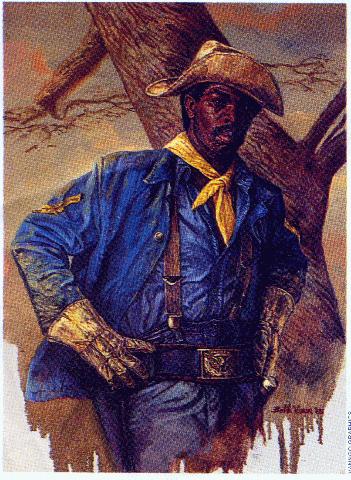ON
OCTOBER 2, 1866, Emanuel Stance, the man who was
to win the Medal of Honor for action in the post-Civil War period,
approached a U.S. Army recruiting officer in Lake Providence, Louisiana.
The recruiter, Lieutenant John Maroney, would record Stance's eyes as "black,"
his hair as "black," and his complexion as "black."
His age would be recorded as 19 and his occupation as that of a "farmer."
A more accurate description of his occupation would probably have been "sharecropper."
Most of the men like Stance who filled the ranks of the 9th and 10th
U.S. Cavalry and the 24th and 25th U.S. Infantry, the four segregated
regiments whose African-Ameridan enlisted men would become known as "buffalo
soldiers," were fomer slaves. After emancipation, many ex-slaves
remained on the same plantations as sharecroppers. Stance, a native of
Carroll Parish,La., was many things: bright-eyed, hardnosed,
intelligent, well-spoken and wiry. One thing he was not, however, was
tall. Because Stance was little more than 5 feet, Maroney hesitated
before allowing him to enlist. But eventually
Stance was allowed to sign his name, and he became a member of Company F
of the

Legendary
Buffalo Soldier Emmanuel Stance
(by Artist:
Bobb. Vann.)
|
2-month-old 9th U.S.
Cavalry. His occupation was now that of "soldier," and he
would remain a soldier for the rest of his life. Stance likely saw the
U.S. Army as the easiest way to a new life out West. At New Orleans, He
joined the rest of the green recruits of the 9th Cavalry and began six
months of intensive training. In the winter of 1866-67, the organization
of the regiment was put into high gear. By the end of February, Stance
had been promoted to corporal and his company had been transferred to
Carrollton, La.
His promotion undoubtedly came
about because he could read and write. Education slaves had been illegal
in the South before emancipation, so literacy was a rare thing among
buffalo soldiers during the early years of their regiments' existence.
Literate buffalo soldiers like Stance were made noncommissioned
officers, since paperwork came with those positions. In March 1867, the
9th Cavalry was reassigned to San Antionio, Texas, where the men
received two months of field instruction and got their first taste of
frontier duty. That duty included policing American Indian tribes and
American settlers, and protecting stage and mail routes. In June,
Stance's Company F was among six companies of the regiment transferred
to Fort Davis, Texas. In July, Stance was promoted to sergeant. That
December, a detachment from Stance's company saved a stage attacked by
100 Mescalero Indians. In driving off the
attackers, the
|
buffalo
soldiers lost one private and three horses. In
January 1868, Company F completed a change of station to Camp Quitman,
which would later become Fort Quitman. That month, the company was among
those besieged by a large band of Indians, Sixteen attacks were repelled
by the men of the garrison. On September 14, a detachment from Company F
was among 60 members of the 9th Cavalry to successfully carry off a
surprise attach against 200 Indians near Horsehead Hills. The
buffalo soldiers killed 25 indians, wounded many more, and captured 200
horses and a large amount of winter stores. Only one soldier was wounded
in the fight. Some months later Company F was transferred again, this
time to Fort McKavett, Texas. On September 16,1869, a detachment from
Stance's company, along with detachments from three other companies,
skirmished with some 200 Comanche and Kiowa on the Salt Fork of the
Brazos River. In an eight-mile running fight, three buffalo soldiers
were wounded while the Indians suffered 25 casualties. After being
reinforced by another detachment from their regiment, Stance and his
unit again skirmished with the Commanche-Kiowa party on the 20th and
21st.
In 1870
Emanuel Stance received the Medal of Honor, but his discipline problems
plagued his long military career.
|